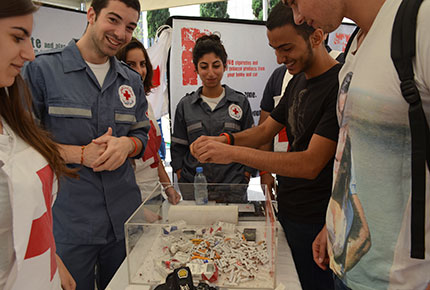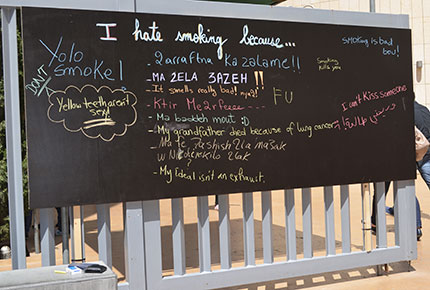A search for why the smoking ban failed in Lebanon
On World No Tobacco Day, MarCom examines the reasons behind the failure of the smoking ban in Lebanon.
Reporting on the failed smoking ban in Lebanon is a trying assignment. Many pub and restaurant owners, who circumvent Law 174 that became effective on September 3, 2012, defend their position by simply saying, “What’s the big deal if our employees inhale smoke for a few hours a day? They can go home, take a shower and change their clothes. Anyway, they’re inhaling pollution all day.” Or, worse, “There’s a loophole for every law in the country, a way around it and everyone has found it for this one. Why should we be the only ones abiding by the ban when others don’t?”
It’s even more frustrating when you hear proof that the ban worked at first. According to one pub owner in the Alleyway, Hamra, “Our businesses here weren’t hurt. The smoking ban was working well and everyone was following it. The Tourism Police were fining people and everyone was falling in line. People didn’t have a problem going outside to smoke,” he said adding, “It was the places that didn’t have an open terrace or that relied on arguileh that suffered. Eventually it reached a point where the police would see people smoking inside and just walk passed. That’s when we stopped being vigilant and the ban fell apart.”
One asthma sufferer threatened to call the, now defunct, hotline on a different pub owner in that same alley. He told her to go ahead, his wasta was strong. She tried calling his bluff, but they didn’t respond.
Dr. Walid Marrouch, assistant professor at LAU specializing in Environmental Economics explains, “Driving a car every day is a voluntary risk that citizens take. On the other hand, secondhand smoke is involuntary. It’s not your fault if someone smokes near you and you inhale it. Whenever there is an involuntary risk, it is the government’s responsibility to protect you, which is what they tried to do.”
The problem, Marrouch says, is that no local risk and management assessment was carried out due to the limited budget the Ministry of Environment had to work with. “That was our downfall. We borrowed reports from other countries and applied the ban. In terms of the economic market, the benefits were clear. It was the lack of a local report that left the government defenseless in the face of pressure from the political market. So, the ban collapsed.”
It is not in the pub and restaurants of Beirut that the adverse effects of the ban’s collapse and the denial about the dangers of smoking are being felt. Dr. Marie-Louise Coussa-Koniski, head of the respiratory disease division at the university’s affiliated hospital LAU Medical Center–Rizk Hospital, doesn’t even need a simile to describe what smoking does to the lungs, “Smoking is literally a fire. It burns your lungs, melting them away because they have been burned.”
Coussa-Koniski is under no illusions that people will wake up just because it’s World No Tobacco Day. “Smoking is an institution and it can only be combated by institutions. As a well respected one, LAU, can lead the way and not just on campus.”
On the university’s Beirut campus, young Red Cross volunteers could be seen negotiating with students who smoke, as part of their campaign to get them to quit the habit. ” I’ll trade you a cupcake, bracelet and one day free gym pass for your pack of cigarettes,” one of the volunteers tells a student. The young man hesitates before giving up half the pack, claiming to need something to smoke “after lunch”.
“I don’t think offering a gym pass is effective. If you can afford cigarettes you can afford the gym,” the student says. Is he considering giving up smoking? “Give up? I just started smoking in November. All my friends smoke. I know the health risks but I won’t be thinking of quitting for years.”
Meanwhile Coussa-Koniski constantly reminds whoever will listen, “Your wealth is your health, protect it!”
More
Latest Stories
- Another Groundbreaking Discovery by the LAU Genetics Team
- LAU Faculty Recognized Regionally for Teaching Innovation
- A New Study by AKSOB Faculty on Ways to Resource Hope During Protracted Displacement
- Navigating Work Stress in Uncertain Times
- Students Invited to “Talk It Out”
- The LAU Mobile Clinics Deliver Healthcare and Renewed Hope to Lebanon’s Displaced
- LAU Achieves Historic Rankings in the Arab World
- When Learning Becomes Survival in the Shadow of Conflict



